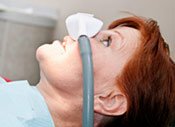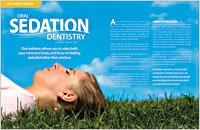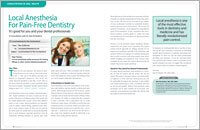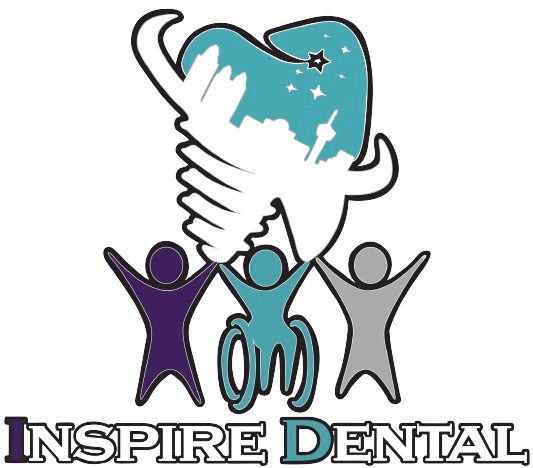
Some people fail to receive the benefits of modern dental treatment because of a simple yet seemingly overwhelming problem: Fear. It isn’t uncommon to have a little anxiety about an upcoming dental procedure. But if your fears have kept you away from the dental office when you know you really should go — take heart! Conscious sedation with nitrous oxide can help you lose that anxiety, and make the whole experience so stress-free that you may not even remember it when it’s over.
Nitrous oxide, a colorless gas with a slightly sweet odor, has been used in medicine for about a century; however its outdated nickname, “laughing gas,” is undeserved. It’s a safe and effective method of administering conscious sedation — which means that you’ll stay awake during the procedure. But when nitrous oxide is used in combination with a local anesthetic, you won’t feel pain or anxiety. In fact, many patients report a feeling of well-being during this type of sedation. All bodily functions remain normal during the administration of nitrous oxide, and its effects wear off quickly afterwards.
How Is Nitrous Oxide Administered?

As a form of conscious sedation, nitrous oxide is inhaled through a small mask that fits comfortably over your nose. The gas is mixed with oxygen as it is being delivered, and both gases are always kept at a level that is safe for the body. In just a few minutes, you may start to experience a floating sensation, and perhaps some tingling in the hands and feet. That’s a sign that the sedation is working. Once it has been verified that you’re calm and comfortable, and that the dose is correct, your dental procedure can begin.
Nitrous oxide itself isn’t a substitute for a local anesthetic — it’s considered an anxiolytic, which means it makes anxiety disappear. For some procedures, you may still need an anesthetic injection. The difference is, you won’t mind. Yet, you won’t be asleep — you’ll be able to speak, be aware of what’s going on, and you will remain in control during the procedure. In fact, the dose can be fine-tuned to just the level of sedation you need.
When the procedure is over, the flow of nitrous oxide is decreased to zero, and the oxygen may be increased. After resting in the chair for a few minutes, you’ll be able to sit up, and soon you can resume normal activities like driving. Although the experience has been compared to “having a couple of drinks,” there is very little “hangover” effect afterward.
Who Can Benefit From Nitrous Oxide?
Most people whose anxiety would otherwise keep them out of the dental chair can benefit from conscious sedation with nitrous oxide. Before beginning treatment, we will take a complete medical history, including your use of both prescription and non-prescription medications. If you are pregnant, have COPD (Chronic Obstructive Pulmonary Disease) or some other pulmonary diseases, or are taking certain drugs, it may not be right for you. However, if you feel that you would benefit from a more stress-free experience in the dental office, ask about nitrous oxide conscious sedation.
Related Articles

Oral Sedation Dentistry Step out from under the shadow of fear and into the calm of sedation dentistry. There are safe and time-tested options available to ensure that you have a positive and painless dental experience. Your apprehension and hypersensitivity to pain melt away, yet you remain awake and in control… Read Article

Overcoming Dental Fear & Anxiety Do you feel relatively calm before your dental appointment or are you a little nervous about a visit to the dental office? Do you worry about it days or weeks before the appointment? Are you actually terrified of it? Whichever end of this spectrum you might be on, you are not alone. It’s possible, even for those who are the most afraid, to reduce that fear and to learn to have treatment in a way that feels calm and safe. Here’s how… Read Article

Local Anesthesia for Pain-Free Dentistry Local anesthesia is one of the most effective tools in dentistry and medicine. It is safe, effective and has totally revolutionized pain control. Without local anesthesia, some dental procedures would be quite stressful for all involved. It’s good for you and for your dental professionals… Read Article
